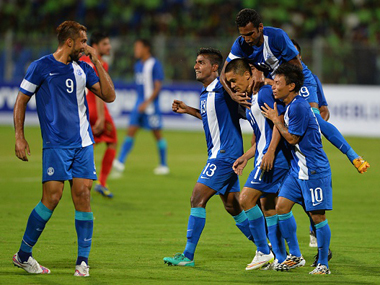Oman striker Imad Al Hosni slipped past three India players and was about to pull the trigger when India midfielder Eugeneson Lyngdoh tracked him down, and cleanly won the ball. He then turned with grace and sprayed a perfect pass to CK Vineeth on the left. In the second half, with Oman 2-1 up against India in their World Cup qualifier Bengaluru, Robin Singh, a hulk of a striker, sprinted from near the halfline to the byline and managed to block a cross from visiting winger Saad Al Mukhaini. [caption id=“attachment_2292522” align=“alignleft” width=“380”] Chhetri and co put in a spirited performance against the better-ranked Oman side. Getty Images.[/caption] India may have lost to opponents ranked 40 places higher – nothing new there - but their approach to the game was a revelation. This was an India that, as vice-captain Sunil Chhetri put — “was not scared.” An India that pressed for ninety minutes, made robust tackles and won most of the aerial battles. At the pre-match press conference, new head coach Stephen Constantine said India would " push, press, fight and play our hearts out”. On Thursday evening at the Kanteerava Stadium, we saw these words come to life. This is not to say that we should get carried away by India’s performance. That India gave away a goal within 30 seconds at home is appalling. That they conceded a clumsy penalty after fighting back to 1-1 was a product of inexperience. But their desire never waned. Rather than capitulating under the pressure against a clearly superior team, they fought to the bitter end. “What you saw out there was not… the norm. We didn’t give in, we didn’t stop and I assure you, we will never be a team to surrender,” Constantine said after the game. What makes India’s performance even more surprising is that Constantine gave five players their debuts. Three of the back four (Dhanachandra Singh, Rino Anto and Lalchhuanmawia) were playing together for the first time. India had only 10 days together and no friendlies to prepare. Oman were together for two-and-a-half weeks and played two friendlies before this match. “Three new players were in defence with me so mistakes are bound to happen,” team captain Arnab Mondal told Firstpost in the mixed zone after the match. “We simply didn’t have enough time to prepare. The match was so close - this could have been us winning on another day.” Mondal, it must be said, was flawless in his first game as India captain, intercepting numerous passes and making vital tackles. The first goal though, was just the kind of thing that shows how important a consistent side is. “We need one set of players for five years,” Chhetri said. “That is when we will start performing. It’s a young team — but for them to keep fighting till the end shows our change in attitude. This side is different from previous ones in a way that these guys are not scared.” Chhetri is right. India’s response to going down early was nervy, but they found their groove. There was a cohesion in a side that is known for being disjointed. Yes, the first 15 minutes were bad and the last 15 were reduced to long-ball play, which Constantine said he “didn’t ask [the team] to play”, but most of the match was not lopsided. India were dangerous on the break and the defence grew in confidence over the course of the game. The team scored a goal in the second half through a superbly worked corner but it was ruled out for offside, a decision Constantine was not happy with. “I saw the Oman set up before the corner and told the bench ’this is a goal’. You better believe it was right off the training pitch," Constantine said. All in all, it was a type of performance from India that will attract football fans - there were over 19,000 fans at Kanteerava stadium for this match. This performance will bring people to the stadiums and get them follow the side consistently rather than sporadically. And that’s no small thing.
At the pre-match press conference, new head coach Stephen Constantine said India would " push, press, fight and play our hearts out”. On Thursday evening at the Kanteerava Stadium, we saw these words come to life.
Advertisement
End of Article
Written by Pulasta Dhar
If there is one place Pulasta Dhar wanted to live, it would be next to the microphone. He writes about, plays and breathes football. With stints at BBC, Hallam FM, iSport, Radio Mirchi, The Post and having seen the World Cup in South Africa, the Manchester United fan and coffee addict is a Mass Media graduate and has completed his MA in Broadcast Journalism from the University of Sheffield." see more


)

)
)
)
)
)
)
)
)



